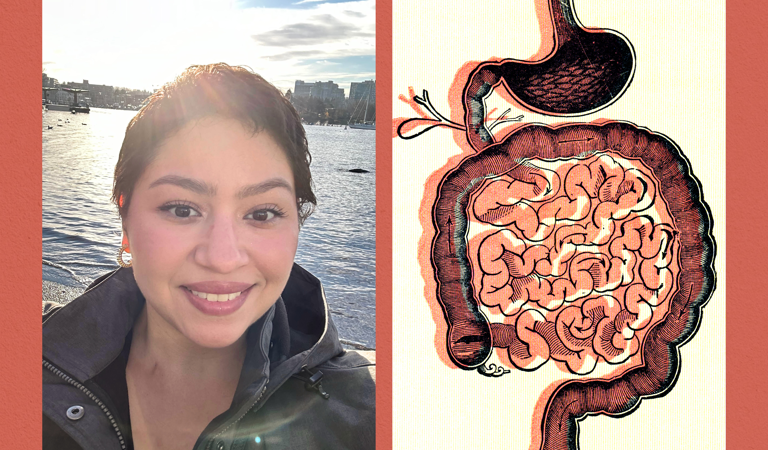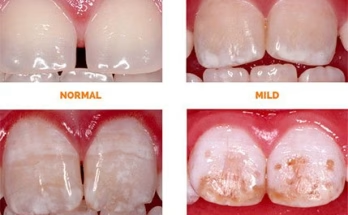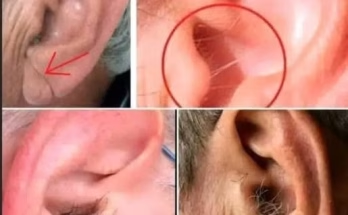Raquel A., 33, never guessed she had cancer, even though she had symptoms that worried her. A few years ago, her bowel movements became increasingly frequent and abnormal, which she figured was due to undiagnosed irritable bowel syndrome (IBS) or a food intolerance. She didn’t have health insurance, so she put off going to the doctor and tried to ease her discomfort with fiber supplements and dietary changes. After getting a job that offered medical coverage, she saw a primary care physician, who told her she likely just had anxiety. Her symptoms worsened, and in 2023, she was diagnosed with stage four colon cancer. Raquel has been sharing her experience with the condition—as well as what she wants others to know about seeking help as early as possible—on TikTok. Here’s her story, as told to health writer Julia Ries.
I first started having noticeable gastrointestinal issues in 2019, right before the pandemic. I was living with a roommate, and, one day, we started talking about how I was going to the bathroom all the time. I could go number two eight to 10 times a day and never feel like I had a complete bowel movement. I told my roommate I suspected I wasn’t getting enough fiber, or perhaps I simply wasn’t eating “healthy enough.” Maybe I had irritable bowel syndrome (IBS), or a gluten or dairy sensitivity. It never occurred to me that I might have cancer.
I didn’t have health insurance. As a result, going to the doctor—unless I had an absolute emergency—wasn’t something I did in my 20s. Instead of checking in with a primary care doctor, I started intermittently taking Metamucil, a fiber supplement, to help regulate my bowel movements and treat random bouts of diarrhea. This helped, at least for a little while.
In 2021, I moved to the greater Seattle area, where I landed a job in the tech industry, and with it, good health insurance. My symptoms remained quiet until they came back in 2022. I was going to the bathroom a lot again, and my bowel movements became uncomfortable. My stools were pencil-thin, sometimes orangish-red in color, and, occasionally, there’d be a little blood. I got abnormally full after eating. I was bloated, no matter what I ate—I tried being dairy-free, then gluten-free. Looking back, these were major warning signs that something was wrong, and I wouldn’t find out until later that they were classic signs of colorectal cancer.
I scheduled a physical—my first in over a decade—in May of 2023. I told my doctor about the digestive issues I’d been experiencing since 2019: the frequent—and sometimes painful—bowel movements, the bloody stools, the early satiety. I shared that it felt like my symptoms were getting worse, and she said I likely had anxiety—and maybe gas—and scheduled a psychiatric appointment for me.
I believed her. I thought, “Maybe she’s right: I’m worrying too much about these symptoms and should just let it go.” In retrospect, she was incredibly dismissive, which I think was a result of my being so young at the time—I was 32, a woman, and a minority. Statistically speaking, people who fall into any of those categories, let alone all three of them, tend to have their health issues dismissed by doctors.
Three weeks after that exam, I developed severe abdominal pain. It wasn’t just localized to my lower stomach or my side—the pain radiated throughout my entire abdomen and toward my lower back. It was unbearable. I nearly fainted in my apartment. I’m not somebody who’s quick to take medication or go to the doctor, but I knew something was wrong, so I went to the emergency room. Again, I doubted myself and thought that perhaps I was making a big deal out of nothing. Fortunately, my ER physician took my pain seriously—she ordered a CT scan, scheduled an abdominal ultrasound, and ran a full panel of bloodwork. When the results came in, she sat down and told me they found cancer on my ovaries and liver. I was diagnosed with ovarian cancer.
I met with an oncologist and had a liver biopsy. That’s when they discovered that the cancer, adenocarcinoma, had originated in my colon and metastasized, or spread, to other organs. I was diagnosed with stage four colorectal cancer. I had an endoscopy and a colonoscopy so the doctors could get a better look—my colorectal cancer was so large and so advanced that they had trouble getting the scope through my colon.
I learned colorectal cancer is very slow-growing. I could have had cancer for eight to 10 years, potentially all of my 20s, without knowing it. With colon cancer, you usually don’t start having noticeable (or even severe) symptoms until it’s progressed to stage 3 or 4. Plus, the symptoms, like nausea, constipation, diarrhea, or difficulty going to the bathroom, can be due to so many other conditions—some serious, like ovarian cancer, but others more benign, such as IBS.
After my diagnosis, I started chemotherapy. The cancer had caused a build-up of fluids in my stomach, the source of the bloating, that I had to have drained. I met with a GI specialist who advised me to tweak my diet—for example, I had to limit how much meat I was eating, cut out raw fruits and vegetables, and stick to soft foods, like pudding and mashed potatoes—which immediately improved my bowel movements. I’ve done various blood tests that assess how my cancer is progressing—including a CEA (a marker for colorectal cancer), CA125 (a marker for ovarian cancer), and CA19 (another cancer marker) tests—and have undergone genetic testing to better understand how my genes may have contributed to the cancer.
I continue to get chemotherapy biweekly, though I’ve switched to another chemotherapy drug because I experienced unpleasant side effects with the first type, and the cancer on my liver and lungs wasn’t responding to that treatment. My doctors informed me that, eventually, the chemo will stop working because my condition is terminal. I don’t qualify for surgery, since my cancer has spread so deeply, but I’m continuing to look into surgical options along with new treatments and clinical trials I can participate in. My chances of reaching survival two years after diagnosis was 20%. At five years, that drops to 5%, but I’m determined to beat the odds.
Throughout this entire experience, I’ve learned how to advocate for myself. After I received my diagnosis, doctors took my condition very seriously and quickly scheduled multiple procedures and appointments for me—but that wasn’t always the case. I’d been dismissed for years, and even after I started chemotherapy, I felt as though my doctor wasn’t listening to my concerns, so I found a new oncologist who has been very responsive and attentive. I’ve learned how important it is to get a second opinion—all you need is that one doctor who is going to listen and fight for you. You might not find that person right away, but keep pressing: Getting screened could be a matter of life or death.
If I hadn’t followed my intuition—if I skipped going to the ER that day in 2022, or stuck with doctors who said nothing was wrong—there’s a chance I wouldn’t be alive. It’s so easy to doubt yourself, especially if medical professionals are downplaying your symptoms, but if you feel like something is wrong, go with your gut. It’s usually right.



